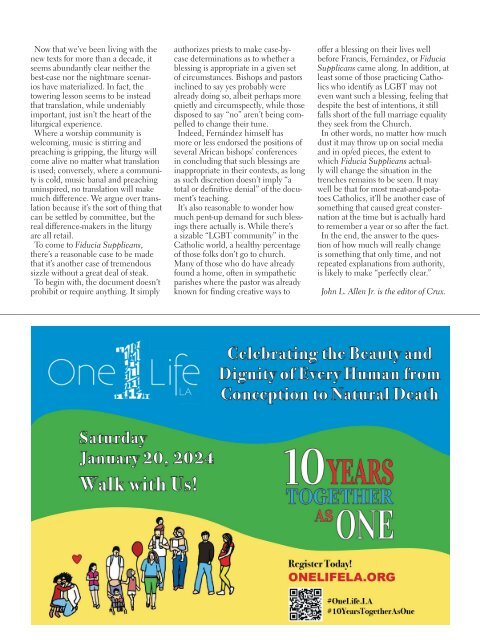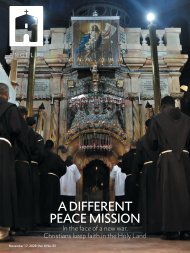Angelus News | January 12, 2024 | Vol. 9 No. 1
On the cover: The Vatican’s new document Fiducia Supplicans on blessings for those in same-sex or “irregular” relationships has probably left the average Catholic with more questions than answers. What does it really say, and why is it so controversial? On Page 10, we break down the saga of the document’s reception with a sampling of some key reactions that illustrate what’s at stake. On Page 20, John Allen explains why the impact of Fiducia on the global Church may be more limited than we think.
On the cover: The Vatican’s new document Fiducia Supplicans on blessings for those in same-sex or “irregular” relationships has probably left the average Catholic with more questions than answers. What does it really say, and why is it so controversial? On Page 10, we break down the saga of the document’s reception with a sampling of some key reactions that illustrate what’s at stake. On Page 20, John Allen explains why the impact of Fiducia on the global Church may be more limited than we think.
Create successful ePaper yourself
Turn your PDF publications into a flip-book with our unique Google optimized e-Paper software.
<strong>No</strong>w that we’ve been living with the<br />
new texts for more than a decade, it<br />
seems abundantly clear neither the<br />
best-case nor the nightmare scenarios<br />
have materialized. In fact, the<br />
towering lesson seems to be instead<br />
that translation, while undeniably<br />
important, just isn’t the heart of the<br />
liturgical experience.<br />
Where a worship community is<br />
welcoming, music is stirring and<br />
preaching is gripping, the liturgy will<br />
come alive no matter what translation<br />
is used; conversely, where a community<br />
is cold, music banal and preaching<br />
uninspired, no translation will make<br />
much difference. We argue over translation<br />
because it’s the sort of thing that<br />
can be settled by committee, but the<br />
real difference-makers in the liturgy<br />
are all retail.<br />
To come to Fiducia Supplicans,<br />
there’s a reasonable case to be made<br />
that it’s another case of tremendous<br />
sizzle without a great deal of steak.<br />
To begin with, the document doesn’t<br />
prohibit or require anything. It simply<br />
authorizes priests to make case-bycase<br />
determinations as to whether a<br />
blessing is appropriate in a given set<br />
of circumstances. Bishops and pastors<br />
inclined to say yes probably were<br />
already doing so, albeit perhaps more<br />
quietly and circumspectly, while those<br />
disposed to say “no” aren’t being compelled<br />
to change their tune.<br />
Indeed, Fernández himself has<br />
more or less endorsed the positions of<br />
several African bishops’ conferences<br />
in concluding that such blessings are<br />
inappropriate in their contexts, as long<br />
as such discretion doesn’t imply “a<br />
total or definitive denial” of the document’s<br />
teaching.<br />
It’s also reasonable to wonder how<br />
much pent-up demand for such blessings<br />
there actually is. While there’s<br />
a sizable “LGBT community” in the<br />
Catholic world, a healthy percentage<br />
of those folks don’t go to church.<br />
Many of those who do have already<br />
found a home, often in sympathetic<br />
parishes where the pastor was already<br />
known for finding creative ways to<br />
offer a blessing on their lives well<br />
before Francis, Fernández, or Fiducia<br />
Supplicans came along. In addition, at<br />
least some of those practicing Catholics<br />
who identify as LGBT may not<br />
even want such a blessing, feeling that<br />
despite the best of intentions, it still<br />
falls short of the full marriage equality<br />
they seek from the Church.<br />
In other words, no matter how much<br />
dust it may throw up on social media<br />
and in op/ed pieces, the extent to<br />
which Fiducia Supplicans actually<br />
will change the situation in the<br />
trenches remains to be seen. It may<br />
well be that for most meat-and-potatoes<br />
Catholics, it’ll be another case of<br />
something that caused great consternation<br />
at the time but is actually hard<br />
to remember a year or so after the fact.<br />
In the end, the answer to the question<br />
of how much will really change<br />
is something that only time, and not<br />
repeated explanations from authority,<br />
is likely to make “perfectly clear.”<br />
John L. Allen Jr. is the editor of Crux.

















